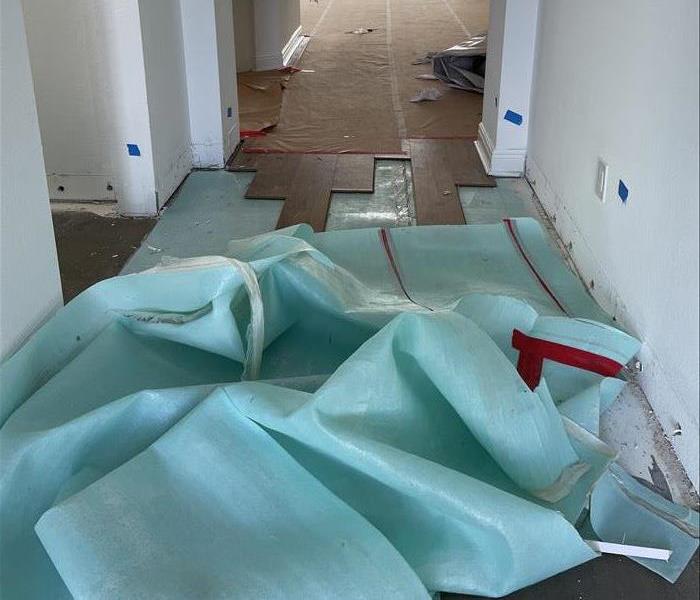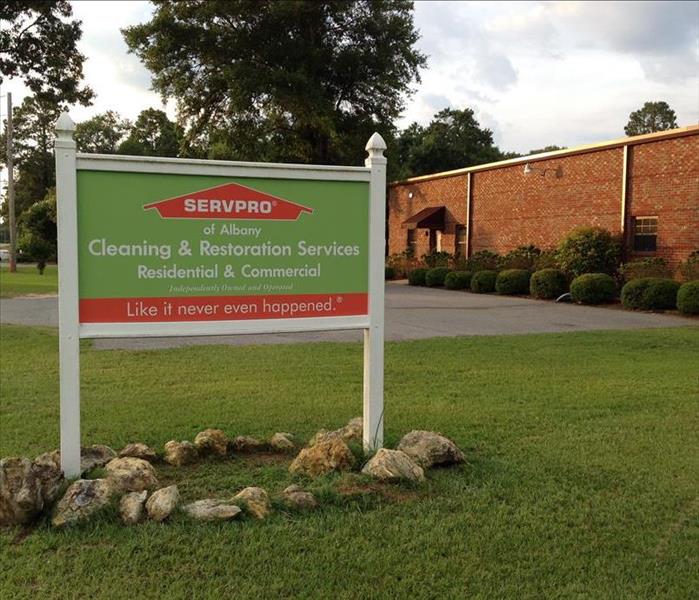Archived General Blog Posts
Protecting Your Home and Belongings During Winter Weather
11/23/2023 (Permalink)
 Interior water damage
Interior water damage
At SERVPRO, we understand that winter weather can pose challenges for homeowners, potentially leading to various types of damage that can be costly and stressful. As experts in home restoration and damage mitigation, we want to share our knowledge and provide valuable tips on how to protect your home and belongings from the effects of winter weather. Your home's safety and well-being are our top priorities.
1. Protecting Your Pipes:
One of the most common and potentially damaging issues during winter weather is frozen pipes. When water inside pipes freezes, it expands, which can lead to burst pipes and water damage when they thaw. To prevent this:
- Insulate exposed pipes, especially in unheated areas like basements, attics, and crawl spaces.
- Keep a slow trickle of water flowing through faucets during extremely cold weather.
- Know the location of your main water shut-off valve in case of a pipe emergency.
2. Roof and Gutter Maintenance:
Winter weather can bring heavy rain and freezing rain, potentially causing roof leaks and gutter issues. To protect your home:
- Inspect your roof for damaged shingles and ensure proper flashing is in place.
- Clean gutters of debris before winter weather arrives to prevent clogs and ice dams.
3. HVAC System Preparedness:
Cold weather can strain heating systems. To ensure your HVAC system performs well during winter:
- Schedule regular maintenance for your heating system to ensure it's in good working condition.
- Replace air filters as recommended by the manufacturer to maintain efficiency.
4. Outdoor Faucets and Sprinkler Systems:
Exterior faucets and sprinkler systems can freeze and cause costly damage. To protect them:
- Turn off the water supply to outdoor faucets and drain the lines.
- Winterize sprinkler systems to prevent frozen pipes and components.
5. Protecting Outdoor Plants and Landscaping:
Winter weather can harm outdoor plants and landscaping. To safeguard your garden and landscape:
- Cover sensitive plants with blankets or burlap to protect them from frost.
- Bring potted plants indoors or into a garage to shield them from the cold.
6. Vehicle Maintenance:
Cold temperatures can affect your vehicles as well. To prevent vehicle damage:
- Ensure your vehicle's antifreeze is at the proper level.
- Keep your gas tank at least half full to prevent fuel line issues.
7. Foundation and Home Exterior:
Winter weather can affect your home's foundation and exterior. To protect them:
- Ensure proper grading around your home to direct water away from the foundation.
- Insulate and seal any gaps in your home's exterior to minimize heat loss and drafts.
At SERVPRO, we are dedicated to helping homeowners protect their homes and recover from damage caused by winter weather. If you experience any issues or need assistance with cleanup and restoration, don't hesitate to contact us. Our experts are equipped with the knowledge and tools to mitigate damage and restore your home to its pre-damaged condition. Your home's comfort and safety are our top priorities, and we're here to support you every step of the way.
Is your business ready for a disaster?
2/2/2018 (Permalink)
Do your employees know your chain-of-command?
Do your night teams know where your water shut-offs are?
Would your employees be able to direct first responders to your fire riser room?
Put simply: Is your team prepared to deal with situations like fire, water & mold damage? What about situations bigger than your Operations capacity?
SERVPRO has a solution. The SERVPRO Emergency Ready Program (ERP). A quick cloud based collection of need-to-know information to handle building emergencies. It's not as exhaustive as a complete risk management program, but it can serve as a great starting point to begin those emergency preparedness discussions with important information that key people at every site should know.
With the Emergency Readiness Program SERVPRO will help you create a functional cloud based data set that can be used for things like staff emergency manuals, emergency contact information and building emergency critical information. Because disasters often happen when you are away, your team will have all of this data at their fingertips, wherever you need it, with a push of a button.
We specialize in commercial drying, cleaning and decontamination needs. Our upfront approach uses a collaborative method to reduce operational risks, minimize downtime and save you money.
Consider this: 50% of businesses that suffer a major disaster will never reopen. And of those that reopened, most of them had a plan.
To strategically align your building operations to make sure you have the help you need in an emergency, give us a call today. The consultation and Emergency Readiness Program is offered at no cost to your facility. Call SERVPRO of Albany and Americus 229-439-2048
Grilling Safety Tips
6/19/2017 (Permalink)
 Stay Safe this Summer. Stock photo.
Stay Safe this Summer. Stock photo.
Grill Safety to consider when breaking out your inner backyard culinary skills.
June and July are peak months for summer grilling fires. The Memorial Day weekend opened up grilling season so if you haven't already, it’s time to dust off the grills and let the inner backyard culinary skills to work. As exciting as it is to break out the grill for the official start of the summer season right, we have to always consider the safety that needs to be taken when preparing to light up the grill.
NFPA (National Fire Protection Agency) says that the U.S. fire department responded to an average of 8,900 home fire that involved the use of grills, hibachis, or barbecues per year. These 8,900 fires caused annual averages of 10 civilian deaths, 160 injuries, and $118 million in direct property damage. Almost all the losses resulted from structure fires. The leading causes of grill fires were a failure to properly cleaning of the grill, placement of the grill because it was placed to close to a structure, and leaving the grill unattended. Five out of six (83%) of grills involved in home fires were fueled by gas while 13% used other sources of fuel.
Precautions to take while grilling
Propane:
- Stay alert when grilling. Avoid grilling when you are tired or have consumed too much alcohol.
- Do Not leave your grill unattended.
- Keep the grill in a place that is free from flammable items and away from porch rails, and low lying branches.
- Keep children and pets as far away from the grill as possible
- Check the gas tank hose for leaks before using it for the first time each year.
NOTE: A light soap and water solution applied to the hose is a great way to check for leaks. You can often smell a propane leak, but propane will also release bubbles when the soap and water solution is applied. If you detect a leak, turn the gas tank and grill off. If the leak stops, get the grill serviced by a professional before using it again. If the leak does not stop, call the fire department.
- Always make sure your gas grill lid is open before igniting.
- If you smell gas while cooking, immediately move away from the grill and call the fire department. Do not move the grill.
- If the flames go out for any reason, turn the grill and gas off and wait at least 15 minutes before re-lighting it.
- Keep your grill clean by regularly removing grease or fat buildup from the grates and trays below.
Charcoal grill safety tips to consider:
- If you use a starter fluid, use only charcoal starter fluid. Never add charcoal fluid or any other flammable liquid to the flames.
- Keep charcoal fluid out of the reach of children and away from heat sources.
- Electric charcoal starters do not use fire. Be sure to use an extension cord for outdoor use.
- When you are finished grilling, let the coals completely cool before disposing in a metal container with a lid.
Property Restoration Can Be a Messy Business
2/4/2015 (Permalink)
 Fire, Water, Mold damage and restoration.
Fire, Water, Mold damage and restoration.
Local disaster recovery specialist offers insight into the complexities of dealing with disaster
Albany and Americus, GA October 9, 2014 - When disaster strikes, property owners need to make a lot of decisions quickly and under pressure. Effective disaster remediation involves a lot of moving parts: remediation specialists, insurance companies, local codes, state codes, documentation and more—and all of this has to happen in an atmosphere charged with emotion and stress.
Benjamin Kyle Carter of SERVPRO® of Albany and Americus says, “Efficiency is key when you are dealing with disaster remediation; it saves our customers money and it makes our work more effective. SERVPRO is an industry leader in work efficiency technology—continually innovating to help both our customers and our business control costs.”
SERVPRO’s proprietary DryBook™ tool is one example of the company’s focus on efficiency and cost control. Remediation projects must be managed to both industry and insurance company standards, and Carter says that tools like DryBook™ help SERVPRO Franchise technicians track and document progress on restoration, cleanup and repair services. “The DryBook™ tool helps us deliver on every detail of every water damage job, every time,” says Carter.
To help avoid regulatory headaches and paperwork pitfalls, Carter suggests property owners consider the following criteria when choosing a remediation company to deal with the aftermath of a disaster.
1. Industry standards: Does your remediation company deliver a product that meets the standards set by
- The Institute of Inspection, Cleaning and Restoration Certification (IICRC)?
- Most major insurance companies, including cycle times and deadline requirements?
2. Recordkeeping: Does your remediation company have a system in place to ensure accurate, complete and convenient benchmarking of each step of the remediation process, including
- Capturing and updating data, including job diary notes, electronically and real-time on the jobsite, with simultaneous updates saved at the central office?
- Using e-signatures to help eliminate lost paperwork and the need to scan documents?
- Providing a complete record of the damage and remediation efforts in images, with descriptions, start-to-finish?
3. Equipment selection: Does your contractor have the ability, on-the-spot, to
- Identify the right equipment for the job, based on the damage description?
- Validate the use of each piece of equipment, automatically, as part of the remediation records?
SERVPRO Franchise Professionals specialize in disaster restoration, cleanup and repair services, helping to remediate damage, making it “Like it never even happened,” for both commercial and residential customers. For more information on SERVPRO of Albany and Americus, please contact Benjamin Kyle Carter at (229) 439-2048 or kcarter@SERVPROalbany.com. For more information about SERVPRO, please visit www.SERVPRO.com.
About SERVPRO®
Founded in 1967, the SERVPRO® Franchise System is a national leader and provider of fire and water cleanup and restoration services and mold mitigation and remediation. SERVPRO’s professional services network of nearly 1,700 individually owned and operated Franchises responds to property damage emergencies ranging from small individual disasters to multi-million dollar losses. Providing coverage in the United States and Canada, the SERVPRO System has established relationships with major insurance companies and commercial clients, as well as individual homeowners.






 24/7 Emergency Service
24/7 Emergency Service


